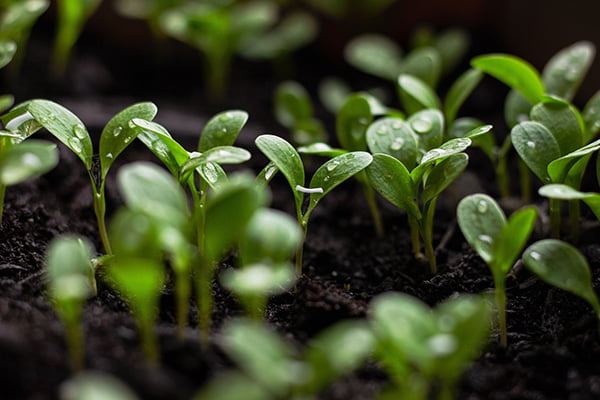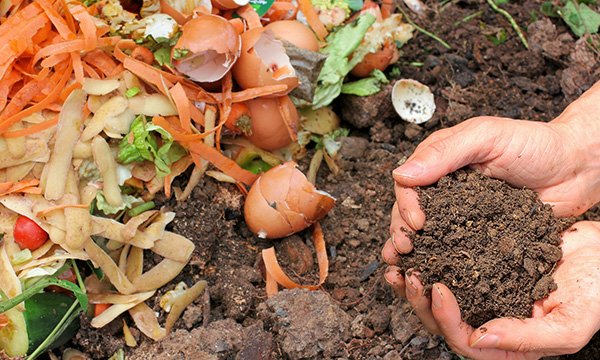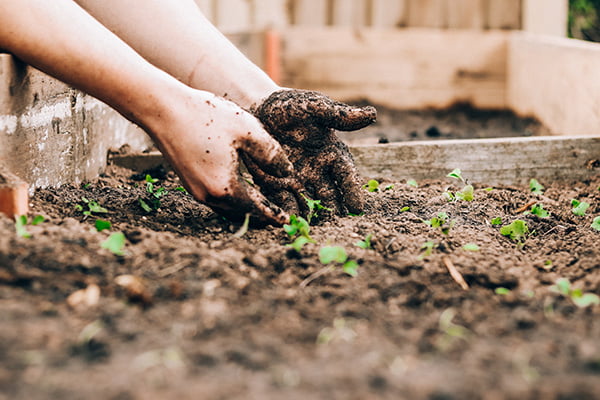The foundation of a healthy and thriving garden lies in its soil. The soil is the unsung hero of your garden, and it plays an indispensable role in the health and growth of your plants. With the right balance of nutrients, pH, and structure, your plants can thrive and flourish in ways you never thought possible. So take the time to care for your garden soil, and the rewards will be plentiful. A bountiful harvest and a beautiful garden await those who prioritize soil health.
Below, we will cover everything you need to know about garden soil, including enriching and maintaining it. Discover the secrets to creating a vibrant, nutrient-rich soil that your plants will love. With a little care and attention, you can transform your garden into a thriving paradise that will make you the envy of the neighborhood.
What is Garden Soil
Garden soil is the medium that provides the essential nutrients, water, and air that plants need to grow and thrive. Good garden soil is loose, crumbly, and well-draining, with a texture that allows water and air to move freely through the soil. It should contain a balance of nutrients that support plant growth, including nitrogen, phosphorus, and potassium, as well as trace minerals like calcium and magnesium. Garden soil can be improved by adding organic matter like compost or manure, testing the soil to determine nutrient levels and pH, and using raised beds or containers to create a controlled growing environment.
Garden Soil Vs. Potting Soil
Garden soil and potting soil are two different types of soil that are used for different purposes. Garden soil is typically used in outdoor garden beds where plants are directly planted into the ground. It is composed of a mixture of sand, silt, and clay, along with organic matter like compost, and can vary in texture and nutrient content depending on the location and climate. Garden soil tends to be heavier and denser than potting soil, with higher clay content, and it may not drain as well as potting soil.
Potting soil, on the other hand, is specifically formulated for use in containers or pots. It is a lighter, more aerated soil that allows for better drainage and air circulation around the root systems of the plants. Potting soil is typically composed of a mix of peat moss, vermiculite, perlite, and sometimes sand, with added nutrients like fertilizer to support plant growth. Because it is designed for use in containers, the potting mix may contain less organic matter than garden soil and may require more frequent fertilization to provide the nutrients that plants need.
Garden Soil vs. Native Soil
Garden soil is typically a mixture of sand, silt, clay, and organic matter like compost or peat moss. It is designed to provide good plant drainage, while native soil may drain differently depending on the composition and location. Garden soil is often enriched with organic matter and other nutrients that can be adjusted to a specific pH level.
Native soil, on the other hand, is the soil that occurs naturally in your area and can vary widely in composition depending on the location and climate. Native soil may have a different texture, structure, and nutrient content than garden soil. Depending on the soil, it may drain too quickly or slowly for certain plants. Native soil may have different nutrient levels than garden soil, and it may not have the same level of nutrients available to plants, which can impact plant growth. Native soil may contain contaminants like heavy metals or chemicals that can be harmful to plants, while garden soil can be amended or screened to remove contaminants.
Garden Soil Vs. Quality Topsoil
While both garden soil and quality topsoil can be used for gardening and landscaping, they have some key differences in composition, nutrient content, drainage, and price. Garden soil is often more nutrient-rich and designed for good drainage, while quality topsoil may be a more affordable option that still provides a good growing medium for plants.

Source: Pixabay
Key Factors For Good Garden Soil Mix
Nutrients
Plants need a variety of nutrients to thrive, including nitrogen, phosphorus, and potassium, as well as trace minerals like calcium, magnesium, and iron. Good garden soil will contain a mix of these nutrients in the right proportions to support plant growth.
Water retention
Soil that retains too much water can lead to waterlogged roots and root rot, while soil that drains too quickly can leave plants thirsty. The ideal garden soil will strike a balance between the two, allowing water to penetrate and nourish the roots without drowning them.
Texture
Soil texture can vary depending on the soil type and the region where it's found. However, good garden soil generally has a loose, crumbly texture that allows air and water to move freely through the soil.
pH
Soil pH can have a big impact on plant growth. Most plants prefer slightly acidic soil with a pH between 6.0 and 7.0. If soil is too acidic or alkaline, it can affect nutrient availability and plant growth.
How To Improve Garden Soil
Test your soil
Soil testing can provide valuable information about the nutrient levels, pH, and overall health of your soil, which can help you make informed decisions about what types of plants to grow and what types of fertilizers or amendments to use.
You can purchase a soil testing kit at your local garden center to determine your soil's pH and nutrient levels. Based on the results, you can adjust your soil using soil amendments like lime, sulfur, or fertilizer.
Add organic matter
Adding organic matter to garden soil can be one of the most beneficial things you can do for your plants and replenish depleted soil. Organic matter, such as compost, manure, or leaf litter, can help improve existing soil texture and add nutrients to the soil. When added to garden soil, organic matter can improve the texture and water-holding capacity of the soil, allowing it to retain moisture and support the growth of healthy roots.
Organic matter also helps to promote the growth of beneficial soil microorganisms that can help break down organic matter into plant-available nutrients. This can increase the amount of nitrogen, phosphorus, and other important nutrients in the soil, making them available to your plants. In addition, adding organic matter can help reduce soil erosion and compaction and improve soil aeration, promoting root growth and overall plant health.
Use raised garden beds
If your native soil is poor quality or you're dealing with a small space, raised beds can provide a controlled environment for your plants to grow. Fill your raised beds with the best soil that is high-quality and packed with organic matter will create an ideal growing environment. However, how much soil you will need to fill the raised bed will require some calculation.
How To Test Garden Soil
To get the best garden soil to help your flowers and plants to thrive, you will need to test your soil. To test your garden soil, you can purchase a soil testing kit from a garden center or send a sample of your soil to a soil testing laboratory. A soil testing kit typically includes a vial to collect a soil sample, a color chart to compare the test results, and instructions on how to perform the test.
When collecting a soil sample, it's important to collect several samples from different areas of your garden to represent the overall soil quality accurately. Use a clean trowel or shovel to collect a sample of soil from a depth of 6-8 inches and place it in a clean container. Mix the soil samples together and allow the soil to dry before performing the test.
Once you have your soil test results, you can use the information to determine the pH of your soil, nutrient levels, and any other factors that may impact your plants' health. If your soil is too acidic or alkaline, you may need to amend the soil with lime or sulfur to adjust the pH. If your soil is deficient in certain nutrients, you can add organic amendments like compost or manure to boost the nutrient levels in your soil.
What to Do if the Soil is Too Acidic?
If your garden soil is below seven pH level and you need to increase the value, you can add lime, wood ash, or organic matter to raise the pH level and make it more suitable for growing a wider range of plants. It's important to avoid adding fertilizers that are also acidic, like ammonium sulfate or urea. Instead, look for more alkaline fertilizers, like bone meal or lime-based fertilizers.
What to Do if the Soil is Too Alkaline?
If your garden soil is above the seven pH level and you need to decrease the value, you can add sulfur and organic matter that contains acids. If your soil is already too alkaline, it's important to avoid adding fertilizers that are also alkaline, like lime-based fertilizers. Instead, look for more acidic fertilizers, like those made from ammonium sulfate or urea. And if you are having trouble lowering the pH level of your soil, you can also consider growing plants that prefer more acidic soil, like blueberries, azaleas, or rhododendrons. These plants can help lower your soil's pH level over time.

Source: Pixabay
Organic Matters To Add To Your Garden Soil
Adding organic matter to your soil or compost is a natural and effective way to improve the quality of your garden soil. Organic matter like leaves, grass clippings, kitchen scraps, and other plant-based materials can be composted to create a nutrient-rich soil amendment that provides numerous benefits to your garden.
1 Leaves
Fallen leaves can be composted to create a rich, crumbly soil amendment that helps to improve soil structure and water-holding capacity. Leaves are also a good source of carbon, an essential component of healthy soil.
2 Grass clippings
Grass clippings are an excellent source of nitrogen, which is essential for plant growth. Composting grass clippings can create a nutrient-rich soil amendment that promotes healthy plant growth and reduces the need for chemical fertilizers.
3 Non Animal Kitchen scraps
Vegetable and fruit scraps, bread, cereal, pasta, nut shells, and eggshells are all excellent sources of nutrients that can be composted to create a nutrient-rich soil amendment. Composting kitchen scraps also reduces waste and helps to create a more sustainable garden.
4 Coffee grounds
Coffee grounds are a rich source of nitrogen and other nutrients that can help to improve soil structure and promote healthy plant growth. It is a popular practice among gardeners looking to improve the quality of their soil. Coffee will not only improve the soil structure, but it can also help to repel some bugs. However, keep in mind that coffee grounds are acidic. Using too many coffee grounds can lower your soil's pH level, making it difficult for some plants to grow.
5 Wood Ash
Wood ash is a good source of potassium and other minerals, which can help to balance the pH level of your soil and provide essential nutrients for plants. However, using wood ash in moderation is important, as too much can make your soil too alkaline and potentially harm your plants.
6 Urine
Urine can be a great way to add nitrogen to your compost pile and promote healthy soil and plant growth. Urine is a good source of nitrogen and other minerals that can help to speed up the composting process and improve the quality of your compost. However, it's important to use urine in moderation, as too much can create an imbalance in the compost and make it too acidic.
7 Beer, wine, and liquor
Next time, instead of pouring out that half-full beer, wine, or leftover liquor, add it to your compost pile. Beer, wine, and liquor contain yeast and other microorganisms that can help to break down organic matter in the compost and speed up the decomposition process. However, it's important to use these liquids in moderation, as too much can make your compost pile too wet and potentially create an unpleasant odor.
8 Cardboard Boxes/ Egg Carton/ Paper Towel Rolls
Uncoated (does not have a shine) with no heavy dyes is compostable. Composting cardboard boxes and egg cartons are easy and eco-friendly ways to reduce waste and enrich the soil. To compost cardboard boxes, first remove any tape, labels, or other non-compostable materials. Then, tear the cardboard into small pieces and add it to your compost pile along with other organic materials like food scraps and yard waste. The cardboard will break down over time, providing valuable nutrients for your plants.
9 Dryer Lint
Composting dryer lint is an innovative way to reduce household waste and create nutrient-rich soil. Dryer lint is composed of tiny fibers from clothing, which are biodegradable and can be composted. To compost dryer lint, simply collect it in a container and add it to your compost pile or bin. Because dryer lint is high in carbon, it should be balanced with materials high in nitrogen, like food scraps and yard waste. It's important to note that dryer lint should only be composted if you use natural fibers in your clothing, as synthetic fibers like polyester do not break down easily.
10 Hair and Pet Fur
Hair and fur are high in nitrogen, which is an important nutrient for healthy plant growth. To compost hair and fur, simply collect it in a container and add it to your compost pile or bin. It's best to cut hair and fur into smaller pieces to help speed up the decomposition process. However, it's important to note that hair and fur should only be composted if they are free of any chemicals or treatments like hair dye or flea treatments.
11 Newspaper
Newspaper is made of biodegradable materials, like wood fibers and ink, that are safe to add to a compost pile. Because the newspaper is high in carbon, it should be balanced with materials high in nitrogen, like food scraps and yard waste. It's important to avoid adding glossy paper or magazines to your compost pile because they contain harmful chemicals.
Organic matters that should never be added to your garden soil
Meat, fish, and dairy products: These materials can attract pests and create unpleasant odors in your garden.
Pet waste: Pet waste can contain harmful bacteria and pathogens that can be dangerous to humans and plants.
Weeds with seeds: Adding weeds that have gone to seed can spread their seeds throughout your garden and create more weed problems.
Diseased plant material: Adding diseased plant material to your garden can spread diseases to healthy plants and potentially harm your garden.
Synthetic fertilizers: Synthetic fertilizers can create an imbalance in the soil's nutrient content and harm beneficial soil organisms.

Source: Unsplash
How To Add Organic Matters To Your Garden Soil
Adding organic matter to your garden soil can be a simple and effective way to improve soil fertility, texture, and structure. It can improve drainage and moisture retention and support healthy growth.
To add organic matter to your garden soil, start by collecting organic materials like grass clippings, leaves, or kitchen scraps. These can be composted in a compost bin or pile to break down into rich, nutrient-dense compost that can be added directly to your garden beds.
You can also add other forms of organic matter, like aged manure or leaf mold, directly to your garden soil. Simply spread a layer of the organic matter over the soil surface and work it into the top few inches of soil using a garden fork or tiller.
How to Maintain Garden Soil Over Time
Maintaining garden soil over time is essential for promoting healthy plant growth and ensuring a bountiful harvest. Here are some tips for keeping your garden soil in top condition:
Add organic matter: Adding compost, manure, and other organic matter to your garden soil can help to improve its nutrient content and promote healthy plant growth.
Mulch your garden beds: Consider adding a layer of mulch to your garden beds. Not only will it help to regulate soil temperature and suppress those pesky weeds, but it can also do wonders for retaining moisture in your soil.
Rotate your crops: Rotating your crops each year can help to prevent soil-borne diseases and nutrient depletion.
Test your soil regularly: Testing your soil for pH level and nutrient content can help you to determine whether you need to add any supplements or adjust the soil's acidity.
Avoid compaction: Walking or working in your garden beds when the soil is wet can cause compaction and limit the air and water flow to your plants. Try to work in your garden beds only when the soil is dry.
When To Enrich Your Garden Soil
The timing of when to add organic matter to your garden soil depends on several factors, such as the type of organic matter being added and the type of plants you are growing.
In general, it is best to add organic matter to your garden soil in the fall or early spring before the growing season, when the soil is not frozen, and the weather is cool. This will give the organic matter time to decompose and release its nutrients into the soil before you begin planting.
If you are using compost or well-rotted manure, you can add it to your garden soil any time of the year, but it is still best to avoid adding it when the soil is frozen or during hot, dry weather. It is also important not to add too much organic matter to your soil at once, as it can cause an imbalance in the soil's nutrient content and harm beneficial soil organisms. Aim to add no more than 2-3 inches of organic matter annually.
